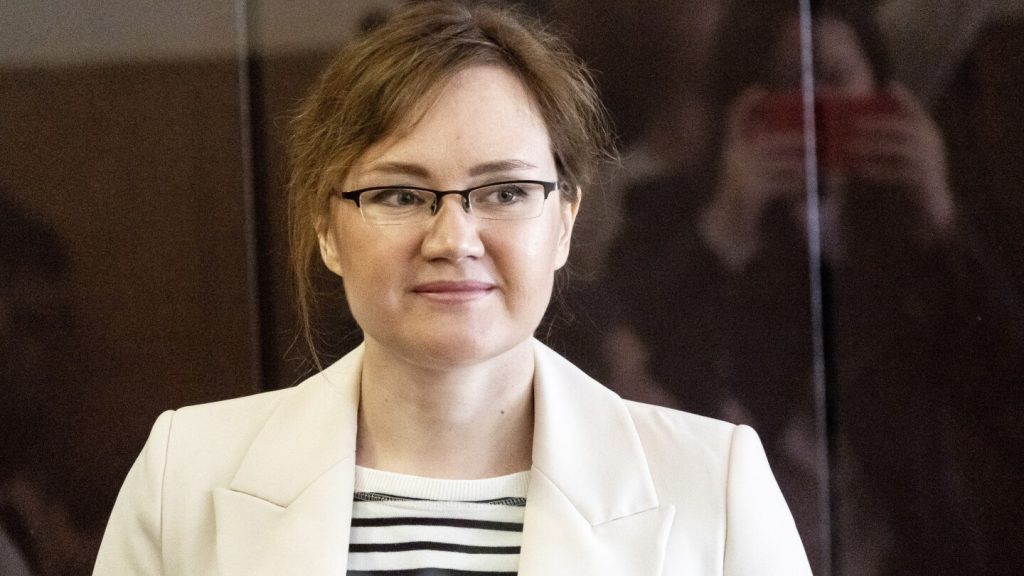The Kremlin’s crackdown on dissent in Russia has resulted in the extension of a former associate of opposition leader Alexei Navalny’s prison sentence. Lilia Chanysheva, who previously headed Navalny’s office in Bashkortostan, had two more years added to her 7 1/2 year prison term for extremism charges. The hearing took place behind closed doors, highlighting the lack of transparency in the Russian legal system. This decision is part of a broader crackdown on opposition activists, journalists, and government critics, which has intensified since Russia’s invasion of Ukraine over two years ago. Many individuals have faced criminal charges for participating in protests or criticizing the war in Ukraine, leading to fines and short jail sentences for thousands.
Chanysheva was initially convicted of calling for extremism, forming an extremist group, and founding an organization that violates rights last summer. These charges were a result of a court ruling that designated Navalny’s Foundation for Fighting Corruption and his regional offices as extremist organizations. Navalny, Russia’s most prominent opposition figure and a fierce critic of President Putin, died in February while imprisoned in a remote Arctic facility. He had been serving a 19-year prison term on politically motivated extremism charges. His death sparked outrage among opposition figures and Western leaders, who accused the Kremlin of responsibility, a claim that Moscow officials vehemently deny.
The extension of Chanysheva’s sentence has been met with condemnation by Navalny’s former spokeswoman, Kira Yarmysh, who described it as a “horror.” Yarmysh criticized the Russian authorities for imprisoning a courageous and honest woman like Chanysheva for her efforts to improve Russia’s future. She accused them of being “simply monsters” for extending Chanysheva’s prison term, indicating the oppressive nature of the Russian government’s treatment of dissenting voices. The lack of transparency and accountability in the legal system, as demonstrated by the closed-door hearing, raises concerns about the fairness of trials and the protection of human rights in Russia.
The Kremlin’s continued crackdown on dissent through harsh sentencing and repression of opposition figures reflects a broader trend of authoritarianism and censorship in Russia. Critics argue that the government’s actions are aimed at silencing any form of opposition and maintaining control over public discourse. The targeting of individuals like Chanysheva, who are associated with Navalny or his organizations, highlights the government’s determination to eliminate dissenting voices and dissenting organizations. The international community has called for the release of political prisoners in Russia and respect for human rights, but the authorities continue to pursue aggressive tactics to suppress dissent.
The extension of Chanysheva’s sentence is seen as a warning to others who may challenge the government or express criticism of its policies. The Kremlin’s use of legal measures to silence opposition voices and restrict freedom of expression underscores the shrinking space for civil society and independent journalism in Russia. The crackdown on activists, journalists, and government critics has created a climate of fear and intimidation, leading many to self-censor or avoid engaging in political activities. Despite international condemnation and calls for change, the Russian government shows no signs of easing its repressive actions, signaling a continued crackdown on dissent and opposition in the country.
As Russia faces mounting criticism and pressure from the international community over its human rights record and treatment of political prisoners, the extension of Chanysheva’s sentence serves as a stark reminder of the government’s willingness to use draconian measures to stifle dissent. The Kremlin’s disregard for due process and fundamental rights raises concerns about the rule of law and democracy in Russia. The fate of individuals like Chanysheva, who are targeted for their association with opposition figures, reflects the broader challenges faced by those seeking to promote democracy and human rights in the country. The ongoing crackdown on dissent signals a troubling escalation in the government’s efforts to suppress opposition voices and maintain its grip on power.


